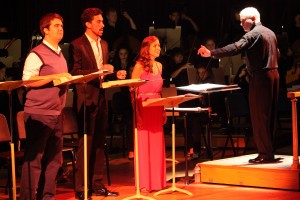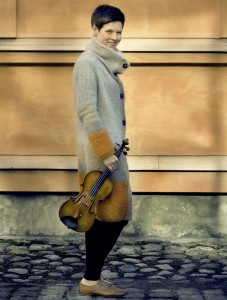The late night Prom presented by the BBC Scottish Symphony Orchestra conducted by Ilan Volkov on the 19th of August is the kind that is guaranteed to draw an audience whose interest and enthusiasm is in inverse proportion to its size. I think there used to be more of them, but it’s hard to be sure. John White, born in 1936, is a rather legendary figure of one wing of the British avant garde, associated with composers such as Cornelius Cardew, Gavin Bryars, Howard Skepton, Roger Smalley, and Dave Smith, as well as Michael Finnissy. He is best known for his piano sonatas, of which there at least 200. People who know his music are devoted to it, but it rarely gets played. This performance of his Chord-Breaking Machine from 1971 was the first one I’ve encountered. The piece involves short rhythmic patters repeated at different rates in the winds and strings, while the brass sustain the harmonies produced thereby, against conflicting rhythmic patters in the percussion. The process as set up blurs the edges of the boundaries of the movement in time from one harmony and the next. It’s really an early minimalist process piece dating from a time before the genre had been conclusively named. This was a very good example of it, with lots of energy, and it was enjoyable and interesting, although it seemed a bit short. (more…)
On the Proms Chamber Music concert at Cadogan Hall on Monday, August 12, the women of the BBC Singers, along with flute player Philippa Davies and harpists Lucy Wakeford, Helen Tunstall, and Hugh Webb, of the Nash Ensemble conducted by Nicholas Kok, performed the UK premiere of Harrison Birtwistle’s The Moth Requiem. During the short interview before the performance, Birwistle said that as a young man he had had an interest in natural history, and was particularly interested in moths. Moths, he said, have a bad reputation because “they eat your cashmere,” going on to say that of the more than a thousand species of moths, only two eat cashmere. He sees the moths as emblematic of thing which are disappearing, both in the world, and in his life. “A lot of people seem to be going from my life,” he said, “and soon I’ll be going.” He wanted to write a piece which dealt with that, but he didn’t want to write anything morbid or sugary; he wanted it to have some idea of the anger he feels about it all.
Like Ravel in Daphnis and Chloe and Vaughan Williams in Flos Campi, Birtwistle uses the chorus instrumentally. Unlike those other composers, he gives them words to sings, although making it clear from the beginning that the perception of those words is not the point. The text of The Moth Requiem is the Latin names of twelve extinct species of moths, along with a poem by Robin Blaser, who (more…)
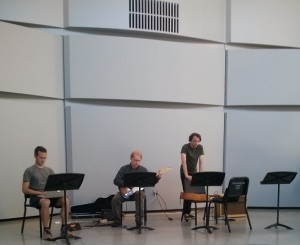 The two-week long series of experimental music concerts in and around Los Angeles concluded Saturday, August 17 with es geht weiter a reading of nine compositions from members and friends of Wandelweiser, an international group of composers and performers founded in 1992. The event was held at the Wild Beast performance space on the Cal Arts campus in Valencia and was curated by faculty and Wandelweiser member Michael Pisaro.
The two-week long series of experimental music concerts in and around Los Angeles concluded Saturday, August 17 with es geht weiter a reading of nine compositions from members and friends of Wandelweiser, an international group of composers and performers founded in 1992. The event was held at the Wild Beast performance space on the Cal Arts campus in Valencia and was curated by faculty and Wandelweiser member Michael Pisaro.
Twelve musicians in various combinations performed the nine pieces and a number of these works were heard in the US for the first time. The instrumentation varied widely – including found objects, standard instruments played normally or by coaxing out new sounds, voices and various electronics. Many of the pieces were very soft with long pauses and this invited a high level of alertness and concentration from the audience.
The nine works offered in this concert were highly varied in their instrumentation and approach – here are some random observations and reactions:
Through the window and the wood – Daniel Brandes. Very soft solitary electronic tone that slowly increases in volume, is then joined by a voice and followed by silence for several minutes. The most subtle of pieces, the long silences and low dynamics are effective in putting the listener in a heightened state of anticipation. (more…)
Mark Anthony Turnage’s Frieze, performed by the National Youth Orchestra of Great Britain, conducted by Vasily Petrenko, on August 11, and Nashit Kahn’s The Gate of the Moon, a concerto for sitar and orchestra, performed by Kahn himself with the BBC National Orchestra of Wales, conducted by David Antherton, on August 12, both raise the question of how one in a new piece can meaningfully reference other music. Turnage’s work was commissioned by the Royal Philharmonic Society to celebrate the organization’s bicentennial and to be on the same program with their most famous and, probably, greatest commission, the Beethoven Ninth Symphony; this shorter work which is clearly modeled on the Beethoven in its general layout, is a sort of gloss in his own language on the older one. Kahn’s Concerto joins an orchestra of western instruments and a single Indian one and aims at joining their indigenous musical languages in a meaningful way as well. (more…)
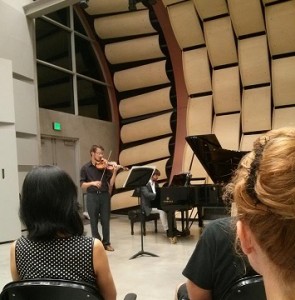 As part of a two-week long concert series of experimental music, For John Cage (1982) by Morton Feldman was heard at The Wild Beast performance space on the campus of California Institute of the Arts in Valencia, CA on August 14. Dante Boon was at the piano and Andrew McIntosh played violin in the concert titled, suitably, ‘Bon Amis‘.
As part of a two-week long concert series of experimental music, For John Cage (1982) by Morton Feldman was heard at The Wild Beast performance space on the campus of California Institute of the Arts in Valencia, CA on August 14. Dante Boon was at the piano and Andrew McIntosh played violin in the concert titled, suitably, ‘Bon Amis‘.
John Cage and Morton Feldman both have historical connections to Cal Arts: Cage received an Honorary Doctorate of Performing Arts from the Institute in 1986, and Morton Feldman was composer-in-residence that same year. The Wild Beast was named in honor of Feldman who, according to the campus website, “likened the ineffable creative energy in art to a wild beast.” The Wild Beast is an airy but not overly large space with good acoustics that were well-suited to this performance.
For John Cage is a quiet piece for piano and violin played at very low dynamic levels, yet all of the nuances could be plainly heard. Typically the piano plays a few notes or a soft chord and the violin answers, followed by a brief pause. The phrases are sometimes repeated, or the violin sounds first or they may play together – but the call-answer pattern predominates. For me the sequence was most effective when the piano made a declarative statement and the violin softly reflected off the slightly harder tones of the keyboard. This seemed to heighten nuances in the violin, especially in the quietest passages.
Dante Boon provided a solid foundation throughout, never tentative with the many piano entrances but always with the delicate touch that this piece requires. His sensitive playing set the stage for the violin and here Andrew McIntosh displayed amazing control of pitch and intonation, even when the sounds coming from his instrument were barely above a whisper.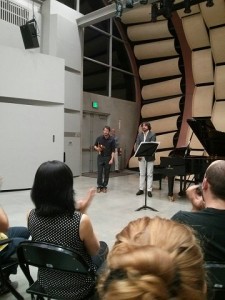
Despite the fragmented nature of the piece – and its 75 minute length – it was never boring. This was due largely to the quality of the playing but also the fact that it was performed live in a space where the finest details were audible. The soft dynamics invite the listener to concentrate on each passage played and to create the context for it. This is challenging listening but those in attendance were engaged throughout – and there were happily no coughing attacks or cell phone outbursts to break the spell. This was an excellent performance of one of the landmarks of late 20th century experimental music.
The concert series concludes with Es geht weiter, music by Jason Brogan, Dante Boon, Taylan Susam, Sam Sfirri, Daniel Brandes, Stefan Thut and Johnny Chang at The Wild Beast, Cal Arts, Valencia, Saturday, August 17 at 5 pm. Admission free.
Tanglewood capped this year’s Festival of Contemporary Music with the U.S. premiere of George Benjamin’s Written on Skin. After an initial brief hiccough (Mr Benjamin forgot his baton when he first came on stage), the orchestra negotiated the technically complex score with no apparent difficulty and, though very large, never overwhelmed the vocalists. This was aided by the light and inventive orchestration; with the exception of a few well-placed monstrous tuttis, most of the time there were only a handful of instruments sounding. The Medieval setting also allowed for occasional light Early Music references: senza vibrato, perfect intervals, and the inclusion of a pair of Mandolins, a Verrophone, and a solo Gamba.
Evan Hughes gave a superlative performance as the Protector, convincingly portraying both domineering patriarch and devastated betrayed husband. Lauren Snouffer was excellent as the Protector’s wife Agnès, particularly during her character’s more dramatic moments, although I found myself occasionally glancing at the title screens to catch the text. Tammy Coil and Augustin Mercante were both superb in their double roles as Angels and as Agnès’ sister and brother-in-law. Isaiah Bell was fine in his double role as the Boy and the third Angel, but again I found myself reading more than I would have liked. All received a well-deserved extended standing ovation.
Staging was minimal – this was a concert performance – but effective; the music alone was quite descriptive, particularly the purely instrumental murder scene (no death aria here!). The front of the stage was divided into three areas: to the left, under yellow lighting, were the Angels; in the center, under red lighting, was the main home; to the right, under blue lighting, were all other locations. The orchestra was so large that the vocalists were forced to pass between the conductor and the orchestra in order to move from the center area to the right. Here’s hoping an American opera company will present a staged version soon – it is certainly deserving.
– Composer Robert E. Thomas teaches at College of St. Rose in Albany, New York.
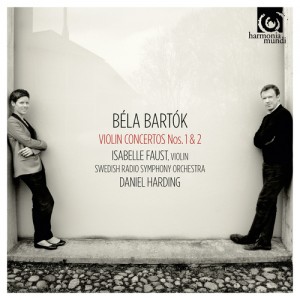
Violinist Isabelle Faust may have impressed you in Mozart last week at the Mostly Mozart Festival. She’ll be back in New York for Beethoven and more next January! Her latest recording explores the sound world of Bela Bartok, including both of his violin concertos, now out on Harmonia Mundi.
“If you talk with a living composer, of course (s)he will be very clear and explain what kind of atmosphere, what kind of sound (s)he wants produced,” says Faust. The importance of new music is profound with Isabelle, who says this interaction between composer and performer is key, and influences how she plays older music.
Hear the entire interview with Isabelle Faust with John Clare, talking about each concerto, creating fresh sounds in programming, and the importance of composers here.
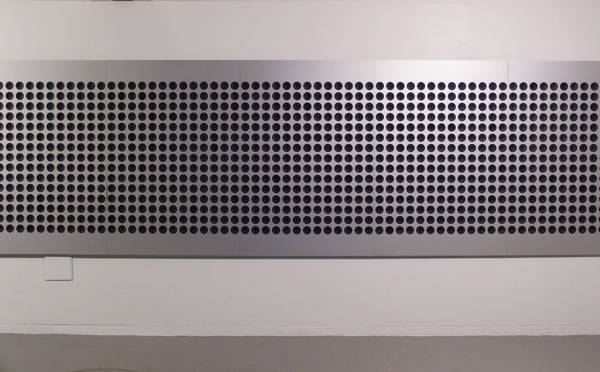
The pseudo-fact that we are ‘visual creatures’ has been drummed into mass culture for the past several decades. It’s pernicious pieces of propaganda, one of those marketing tools that is so pervasive and in-plain-sight that social critics and paranoids searching for subliminal messages and methods of mass coercion not only overlook it, they embrace it. We see and therefore we buy what we see is the way it goes, from artful design to pornography to fine art, where currently overcompensated rentiers pay immoral sums for works meant that, when hung on the wall of the McMansion, are meant to dazzle and intimidate with their pedigree and cost.
It’s bullshit, of course. Yes we see and are interested in what we see, but our most important sense organ is our ears, we are hearing creatures. Our eyes are promiscuous and fickle, what pleases them changes from year to year and culture to culture. But our ears are connected to our lizard brains and our souls. The thing that goes bump in the night is universal and eternal, the way it sets our hearts racing and sense on edge is as human as it gets, and the effect that sound has on us is exponentially more powerful than that of images. As R. Murray Schafer has pointed out, we can’t close our ears.
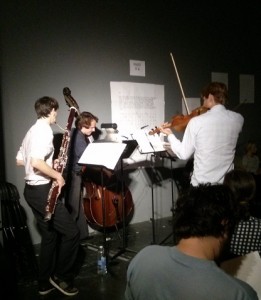 On August 9, Christian Wolff’s Changing the System (1973) was performed by the new experimental music group Southland Ensemble, in the heart of historic China Town here in Los Angeles. About 40 people filled Automata, a small space at Chung King Court dedicated to the experimental arts, to hear Wolff’s politically charged and innovative work that utilizes graphical scoring designed to inspire a kind of consensus-driven interpretation from the players. Enlarged reproductions of the score were hung on the walls and the audience was encouraged to walk about and inspect them during the performance.
On August 9, Christian Wolff’s Changing the System (1973) was performed by the new experimental music group Southland Ensemble, in the heart of historic China Town here in Los Angeles. About 40 people filled Automata, a small space at Chung King Court dedicated to the experimental arts, to hear Wolff’s politically charged and innovative work that utilizes graphical scoring designed to inspire a kind of consensus-driven interpretation from the players. Enlarged reproductions of the score were hung on the walls and the audience was encouraged to walk about and inspect them during the performance.
Christian Wolff is the last surviving member of the New York School of experimental composition that famously included Morton Feldman and John Cage. In fact it was Wolff who gave John Cage a copy of I Ching , stimulating that composers use of random processes in composition. And Wolff himself, according to the program notes, sought “to turn the making of music into a collaborative and transforming activity…” allowing the players to work out the realization of the piece within the guidelines of the score. (more…)
Tuesday night’s Prom concert, by the BBC Philharmonic, conducted by John Storgårds, included, as part of a commemoration of the 60th anniversary of the Queen’s coronation, Edmund Rubbra’s Ode to the Queen, performed regally by Susan Bickley. Rubbra’s music is close to being completely unknown now, but in its day was rather successful; in 1961 on the Third Program, what is now BBC Radio 3, there were more of his pieces played than works of Berg, Copland, Ives, Janacek, Messiaen, or Tippett, according to the program notes for this concert. That all was changed by William Glock, who, apparently, when he took over as comptroller of the BBC, decreed that no more of Rubbra’s music would be played, and that had its effects on the possibilities for the music’s dissemination. I have to say that absolutely nothing about Ode to the Queen seemed to indicate that that was a bad move. Occasional pieces are usually not the best indication of a composer’s music, but although somewhere in all of Rubbra’s music (and there seems to be lots of it) there must be something to support Adrian Boult’s remark, quoted in the program, that Rubbra “goes on creating masterpieces,” this wasn’t it. The program started with Walton’s march Orb and Sceptre, which was written for the coronation; which seems to me to be far less successful than Crown Imperial, the march he wrote for the previous coronation.
The program also included another work which ran afoul of stylistic fashion, the Symphony in F#, Op. 40, of Erich Wolfgang Korngold. By the time Korngold finished his symphony and it was played, in 1952, he had already been more or less forced by events
